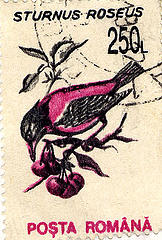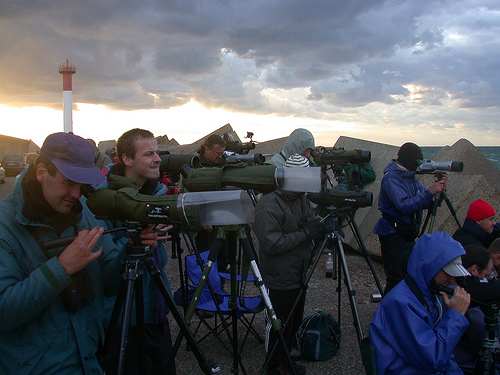Rare starling ‘twitched to death’: is this the countryside version of slashdotting?
- Complaining about the Mainland - 17th August, 2024
- New island designation – is it just greenwash? - 26th April, 2024
- Police and Crime Commissioners – a solution or a problem? - 21st April, 2024
The BBC’s Today programme broadcast a sorry tale of a vagrant Rosy Starling – normally seen in India and some parts of continental Europe – which arrived in coastal Norfolk and soon afterwards died.

A stamp with a picture of a Rose-coloured starling.
The lady in whose garden it finally turned up its toes was upset by the behaviour of fanatical birdwatchers or ‘twitchers’, saying:
They were just running along our paths, chasing the bird from wherever it went, ceaselessly. They never stopped for two days.
Anyone who has worked on a nature reserve will recognise how she feels. The Ranger recalls a few times over the years when a site he has been working on appears on ‘Birdline‘ or something of the sort. It’s kind of the countryside equivalent of slashdotting. You are going about your business peacefully when suddenly multitudes of rather hostile-seeming and highly competitive young chaps arrive – usually the most aggressive ones first, naturally. They stop at nothing to see the bird. They demand to know where it is. They demand to go in places where they should not. If refused, they go there anyway. They come at odd times (having driven all night, for example) and from odd directions (having followed an online map or GPS) and are not interested in anything else. They see the damned thing, or worse, they don’t. Then they go. It’s all very unsettling, and occasionally results in damage or mess, but more often just a feeling of having been somehow violated. Soon afterwards the nice birdwatchers come, and are friendly. They sometimes get a colder reception than they deserve because the staff have been annoyed by the twitchers.

So can anything be done? Probably not. The lady in Norfolk is critical of the RSPB from not investigating the matter. The RSPB pretty much washes its hands of the issue, saying:
…we do not plan to launch an inquiry. We are not aware of any widespread problems with twitchers. We would regard this as an isolated local incident.
The Ranger sympathises. The RSPB cannot be accountable for the activities of the twitchers, any more than the Office of the Rail Regulator is responsible for trainspotters. Furthermore, contrary to what they say, this sort of thing happens all day, and much of the night, all over the country. The birds don’t usually die, admittedly. But the twitchers descend, and will continue to do so. It’s just that it isn’t normally happening rather obviously in suburban streets and gardens.

Tips are notorious spots for the most ardent of gullwatchers. A former lecturer of mine was an expert in these matters. He believed that gulls had an uncanny knowledge of the workings of tips, as he observed that very early each morning the birds would set off from the coast to visit these inland feeding sites before the landfill opened for the day, but on Sundays they went out to sea, as the landfill site was shut. How did the gulls know it was Sunday? He did not tell us, and I’m still wondering.
A few years ago visiting a huge municipal rubbish tip on the outskirts of Gloucester it was intriguing to see the usual vast numbers of seagulls enhanced by vast numbers of twitchers lugging telescopes and cameras up slopes that thinly covered rubbish dumped by Gloucester citizens in less enlightened days than now. The twitchers had heard of the arrival of a rare american gull. Whether it was spotted or not we didn’t discover tho, nearby Slimbridge was sceptical about its presence.